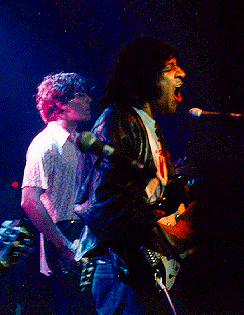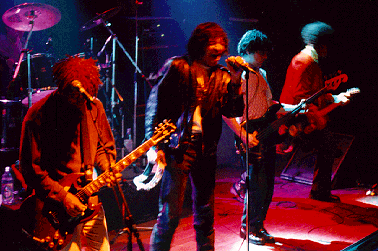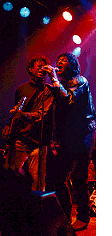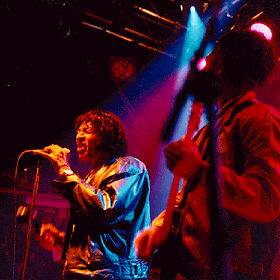

 |
|
 | |

 Back in the 60's, Love combined the folk rock strains of the Byrds with those of the Beatles and the Rolling Stones. With some R&B and jazz added, the recipe for Love was complete.
Back in the 60's, Love combined the folk rock strains of the Byrds with those of the Beatles and the Rolling Stones. With some R&B and jazz added, the recipe for Love was complete.

Liner photo from "Forever Changes" 1968: From the left: John Echols, Bryan Maclean, Ken Forssi, Arthur Lee, Michael Stuart.
At first the group was called the Grassroots. However, since there was another band with that name, the singer, composer and multi-instrumentalist Arthur Lee chose another name, a name which probably was as typical as could be for the age of flower power - also the chief slogan for the drug advocates: Love.
 On the unofficial Love homepage on the Internet, Arthur Lee declares:
On the unofficial Love homepage on the Internet, Arthur Lee declares: - It's a big word, it's the best part of life. We got to love each other. My preference is to get along with everybody.
- It's a big word, it's the best part of life. We got to love each other. My preference is to get along with everybody. But he supplemented one clarification, which possibly explains why the band continuously was dispersed and re-formed:
But he supplemented one clarification, which possibly explains why the band continuously was dispersed and re-formed: - As long as you do what I say, no problem.
- As long as you do what I say, no problem. Love's the word, right.
Love's the word, right. Arthur Lee was born in Memphis, Tennessee in 1944, and his real name is Arthur Taylor Porter. He moved to Los Angeles and started writing songs. On one of his early compositions, a certain Jimi Hendrix (who had just got the sack from Little Richard's band) was playing.
Arthur Lee was born in Memphis, Tennessee in 1944, and his real name is Arthur Taylor Porter. He moved to Los Angeles and started writing songs. On one of his early compositions, a certain Jimi Hendrix (who had just got the sack from Little Richard's band) was playing.  This collaboration was resumed several years later. In 1970 Love toured England and recorded some more tracks with Jimi Hendrix. "The Everlasting First" appears on the album "False Start". Unfortunately the rest is gone, due to assorted ignoramuses.
This collaboration was resumed several years later. In 1970 Love toured England and recorded some more tracks with Jimi Hendrix. "The Everlasting First" appears on the album "False Start". Unfortunately the rest is gone, due to assorted ignoramuses.
 | From the Gino concert 1996. Photography © K-E Tallmo. |

Lee founded the group in 1965, the debut album "Love" (1966) reached top 50 on the US charts, and the single "My Little Red Book" (by Burt Bacharach) ended up 52nd. This is typical for Love, they were highly influential, but nobody bought their records.
 The line-up on the debut album was Arthur Lee, vocals, harmonica, as well as occasional guitar, bass and drums; John Echols, guitar; Bryan Maclean, rythm guitar and vocals; Ken Forssi, bass; and Alban Pfisterer, drums.
The line-up on the debut album was Arthur Lee, vocals, harmonica, as well as occasional guitar, bass and drums; John Echols, guitar; Bryan Maclean, rythm guitar and vocals; Ken Forssi, bass; and Alban Pfisterer, drums.
 The sequel "Da Capo" (1967) climbed to number 33 on the charts. The song "7 And 7 Is" is considered a precursor of Heavy Metal. The notion of 20 minute tracks was also one of Arthur Lee's ideas. On this album Pfisterer played harpsichord and organ, Michael Stuart (from Sons of Adam) played drums, and Tjay Cantrelli played flute and sax.
The sequel "Da Capo" (1967) climbed to number 33 on the charts. The song "7 And 7 Is" is considered a precursor of Heavy Metal. The notion of 20 minute tracks was also one of Arthur Lee's ideas. On this album Pfisterer played harpsichord and organ, Michael Stuart (from Sons of Adam) played drums, and Tjay Cantrelli played flute and sax.
 In 1968 the masterpiece "Forever Changes" was released, an album that is sometimes compared to the Beatles' "Sgt. Pepper". When the British music magazine Mojo picked out the 100 best albums ever, "Forever Changes" ended up as number eleven. At this time, the line-up was reduced to Lee, Echols, Maclean, Forssi and Stuart.
In 1968 the masterpiece "Forever Changes" was released, an album that is sometimes compared to the Beatles' "Sgt. Pepper". When the British music magazine Mojo picked out the 100 best albums ever, "Forever Changes" ended up as number eleven. At this time, the line-up was reduced to Lee, Echols, Maclean, Forssi and Stuart.
 Of course, the album sold zilch (number 154 on the US charts), still - it's brilliant. At least the melodies and the arrangements. As for the texts, that's entirely a different story. Arthur Lee's and the others' inclination for drugs seems to claim its due.
Of course, the album sold zilch (number 154 on the US charts), still - it's brilliant. At least the melodies and the arrangements. As for the texts, that's entirely a different story. Arthur Lee's and the others' inclination for drugs seems to claim its due.
 A run-through of the songs is definitely appropriate.
A run-through of the songs is definitely appropriate.
 The album commences with the exquisite melody of "Alone Again Or". It is one of the big mysteries of rock history that this single never was a hit.
The album commences with the exquisite melody of "Alone Again Or". It is one of the big mysteries of rock history that this single never was a hit.
 Most of the songs on "Forever Changes" are Arthur Lee compositions, but the best track of them all, "Alone Again Or" is actually written by guitarist Bryan Maclean (the brother of Maria McKee, by the way).
Most of the songs on "Forever Changes" are Arthur Lee compositions, but the best track of them all, "Alone Again Or" is actually written by guitarist Bryan Maclean (the brother of Maria McKee, by the way).

From the Gino concert 1996. Photography © K-E Tallmo.
It is a lovesong with the characteristic line "And I will be alone again tonight my dear". The tune develops with acoustic guitar, bass and drums. Then brass and a solo trumpet is added. The brass and string arrangements bring the experiments of the Beatles to mind, but Love is still far from the uninhibited experimenting that characterized "Sgt. Pepper".
 "A House Is Not A Motel" is quite a typical title for Arthur Lee. Probably it has some crucial meaning that is not immediately evident, since the verses deviate heavily from each other in content. Sometimes you get the impression that lines have been mixed at random and then typed out:
"A House Is Not A Motel" is quite a typical title for Arthur Lee. Probably it has some crucial meaning that is not immediately evident, since the verses deviate heavily from each other in content. Sometimes you get the impression that lines have been mixed at random and then typed out:
By the time I'm through singing
The bells from the schools of walls will be ringing
More confusions, blood transfusions
The news today will be the movies for tomorrow
And the water's turned to blood ...
In the middle of that tune you hear the shout "All right now", like a carbon copy of Jim Morrison of The Doors . These two bands were competitors at the same record company. But the Doors were the band with a world wide success, while Arthur Lee's group was a success among the critics, at the most.
 When Jac Holzman, the founder of the record company Electra, heard Love perform with the Doors as supporting act, he immediately signed up a contract - with the Doors. That is probably as close as Love ever came to real fame.
When Jac Holzman, the founder of the record company Electra, heard Love perform with the Doors as supporting act, he immediately signed up a contract - with the Doors. That is probably as close as Love ever came to real fame.
 Arthur Lee is a good guitarist, that is evident on "A House Is Not A Motel". Maybe he had listened really close to "Days of Future Passed" with The Moody Blues. One of the tunes had an unmistakable Moody character - especially in the vocal parts. And that group has hitherto not been on any hundreds list.
Arthur Lee is a good guitarist, that is evident on "A House Is Not A Motel". Maybe he had listened really close to "Days of Future Passed" with The Moody Blues. One of the tunes had an unmistakable Moody character - especially in the vocal parts. And that group has hitherto not been on any hundreds list.
 "The Daily Planet" is not, in spite of its title, about Superman and Clark Kent's newspaper. The text goes thus:
"The Daily Planet" is not, in spite of its title, about Superman and Clark Kent's newspaper. The text goes thus:
All in all it's just a day like
All the rest so do your best with
Chewing gum and it is oh so, repetitious
Waiting on the sun.

From the Gino concert 1996. Photography © K-E Tallmo.
Possibly, the line "Waiting on the sun" is alluding to The Doors' album title "Waiting For The Sun".
 Arthur Lee obviously listened to Syd Barrett of the Pink Floyd, who wrote the songs "Arnold Layne" and "See Emily Play" in 1968. Pink Floyd plus Moody Blues plus Byrds plus Beatles - and suddenly we end up with Love.
Arthur Lee obviously listened to Syd Barrett of the Pink Floyd, who wrote the songs "Arnold Layne" and "See Emily Play" in 1968. Pink Floyd plus Moody Blues plus Byrds plus Beatles - and suddenly we end up with Love.
 "Old Man" was written by Bryan Maclean, and this is one of the best songs. Like Bobby Krieger of the Doors, who wrote the great singles ("Light My Fire" and "Touch Me"), Maclean is the hit maker of Love. Only in theory though, since Love didn't have any real hits.
"Old Man" was written by Bryan Maclean, and this is one of the best songs. Like Bobby Krieger of the Doors, who wrote the great singles ("Light My Fire" and "Touch Me"), Maclean is the hit maker of Love. Only in theory though, since Love didn't have any real hits.
 Arthur Lee is back in "The Red Telephone". A few text samples: "Sitting on a hillside, Watching all the people die", "How do you feel? I feel real phony when my name is Phil, Or was that Bill?", "Sometimes my life is so eerie, And if you think I'm happy, Paint me white". Consistency is not one of Lee's strongest points.
Arthur Lee is back in "The Red Telephone". A few text samples: "Sitting on a hillside, Watching all the people die", "How do you feel? I feel real phony when my name is Phil, Or was that Bill?", "Sometimes my life is so eerie, And if you think I'm happy, Paint me white". Consistency is not one of Lee's strongest points.
 The smoothest title of the album is track number 7: "Maybe The People Would Be The Times Or Between Clark And Hilldale". Here Lee connects the verses in an unusual fashion. A word omitted in the last line of one verse is filled in with the first word in the next verse:
The smoothest title of the album is track number 7: "Maybe The People Would Be The Times Or Between Clark And Hilldale". Here Lee connects the verses in an unusual fashion. A word omitted in the last line of one verse is filled in with the first word in the next verse:
What is happening and how have you been
Gotta go but I'll see you again
And oh, the music is so loud
And then I fade into the ...
Crowds of people standing everywhere
'Cross the street I'm at this suave affair
And here they always play my songs
And me, I wonder if it's ...
Wrong or right they come here just the same
Telling everyone about their games
And if you think it obsolete
Then you go back across the street
Yeah, street, hey hey
In "Live And Let Live" he is joking (I guess): "And so the story ended, Do you know it oh so well, Well should you need I'll tell you, The end-end-end-end-end-end-end-end". This tune, however, bestowes on us a really steamy guitar solo.
(July 1996)
From the Gino
concert 1996.
Photography
© K-E Tallmo. 
"The Good Humor Man He Sees Everything Like This" is yet another delightful melody with the following post-structuralist wording: "Merry-go-rounds are going around in and all over, The town in the morning, in the morning, La da da, da da da da". Sounds a little like the American group Left Banke, if somebody remembers them. They had a couple of hits with "Walk Away Renee" (later snitched by The Four Tops) and "Pretty Ballerina" (1966).
 Finally, the song "You Set The Scene" with a few puns: "You think you're happy and you are happy, That's what you're happy for." Enough.
Finally, the song "You Set The Scene" with a few puns: "You think you're happy and you are happy, That's what you're happy for." Enough.
 There are 15 albums out with Love, some of them collections or live recordings. Most of them are disasters and cannot be recommended.
There are 15 albums out with Love, some of them collections or live recordings. Most of them are disasters and cannot be recommended.
 But buy "Forever Changes", play "Alone Again Or", and press the repeat button. Enjoy!
But buy "Forever Changes", play "Alone Again Or", and press the repeat button. Enjoy!
© Copyright Harry Amster.